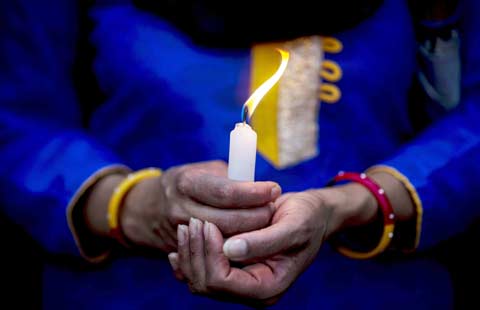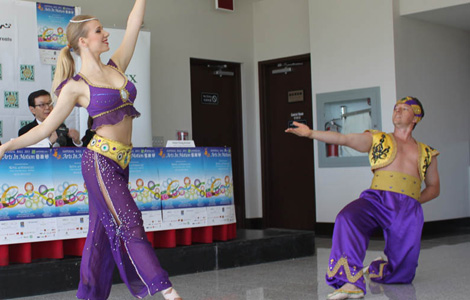Expectations are climbing in the mountains of Garze
Updated: 2015-05-08 10:38
By Ren Qi(China Daily USA)
|
||||||||
When I reached Sichuan province's Tibetan area, I was impressed by the blue sky and the typical Tibetan structures. However, my excitement quickly made way for anxiety when I got to a mountaintop 4,300 meters high.
The lack of oxygen and an acute reaction to the high altitude made it difficult to breath.

Luckily I acclimatized to the altitude after a day of travel by bus, and I could once again enjoy the beauty of the land.
I had been traveling in Garze Tibetan autonomous prefecture, which covers more than 151,000 square kilometers of western Sichuan. It is home to about 880,000 people, with almost 78 percent ethnic Tibetan.
Yangjen Drolma, 26, is an ethnic Tibetan who works at a local tourism office. She told me she went to high school and university in Chengdu, the provincial capital, where she had been given a Han name, Song Yujie. After seven years away, I asked her why she had returned to Garze.
"I may have more opportunities to get a better job in the big city, but I can enjoy the leisurely lifestyle and clean air here," she said.
What she said reflects the mind-set of the new generation of Tibetan young people in Garze. Today, more are returning after years of studying in major cities to work in government jobs or to start a business in a prefecture that has developed rapidly in recent years.
According to official data, last year the GDP here reached 46.5 billion yuan ($7.5 billion), a 4.2-percent increase on 2013. The prefecture has also invested more than 4 billion yuan in tourist development.
Sichuan has been encouraging developed cities to work with Tibetan areas. In 2012, the provincial government launched the Tibet-aid program, which involves seven cities helping 20 Tibetan towns.
By the end of last year, applications had been made for more than 463 projects, with a combined investment of 2.584 billion yuan. A total of 3,667 city cadres have also been assigned to work in Tibetan areas for two years, putting to use their advanced management experience.
Luo Yixue worked as a government tourist official in a small town near Chengdu before he was sent to Daofu, in Garze. He is now deputy director of the Luhuo Tourist and Culture Bureau.
As a Han cadre, he said everything was difficult at first due to the cultural gaps.
"My wife and my 2-year-old daughter still live in Chengdu, but my family have given me their full support for my Tibet-aid career, which I appreciate a lot," he said. "I have stayed in Daofu for a year, and now local Tibetans treat me as a relative.
"I'm confident I can do a good job in my second year," the 30-year-old added with a smile.

 Media players discuss bilateral role
Media players discuss bilateral role
 Beijing female pilots ready for takeoff
Beijing female pilots ready for takeoff
 Premier meets with group of innovators over coffee
Premier meets with group of innovators over coffee
 A glimpse of last rehearsal for V-Day parade
A glimpse of last rehearsal for V-Day parade
 Unusual but true: Breast milk ice cream just in time for royal baby
Unusual but true: Breast milk ice cream just in time for royal baby
 Candlelight vigil held for victims in Nepal earthquake
Candlelight vigil held for victims in Nepal earthquake
 Across Canada (May 8)
Across Canada (May 8)
 Ten photos you don't wanna miss - May 7
Ten photos you don't wanna miss - May 7
Most Viewed
Editor's Picks

|

|

|

|

|

|
Today's Top News
Media's role called crucial
Memory of Flying Tigers honored
Economic projects assist 'Belt and Road Initiative'
Chinese team helps heal Nepal
Joint anti-graft push needed, US delegates told
US NSA's phone spying program ruled illegal by appeals cour
US to launch federal probe into Baltimore police practices
AIIB 'backfired' on
US: Expert
US Weekly

|

|







